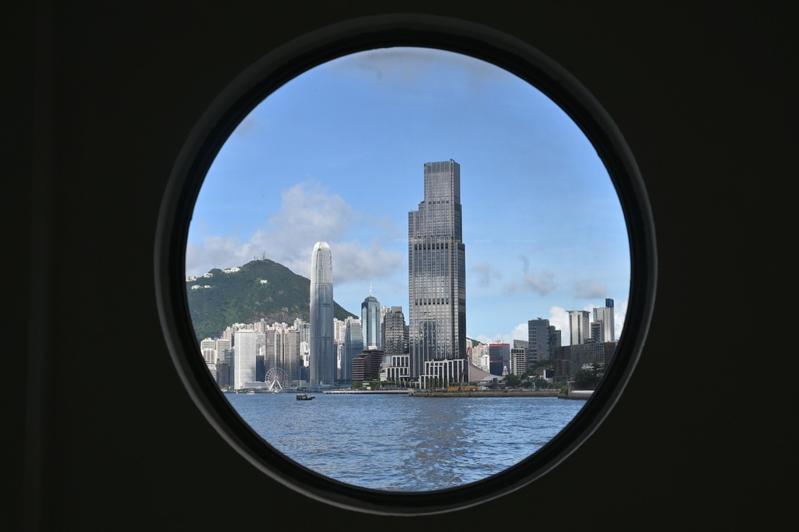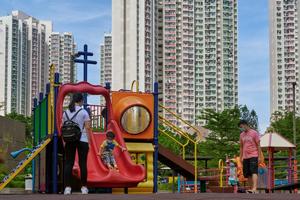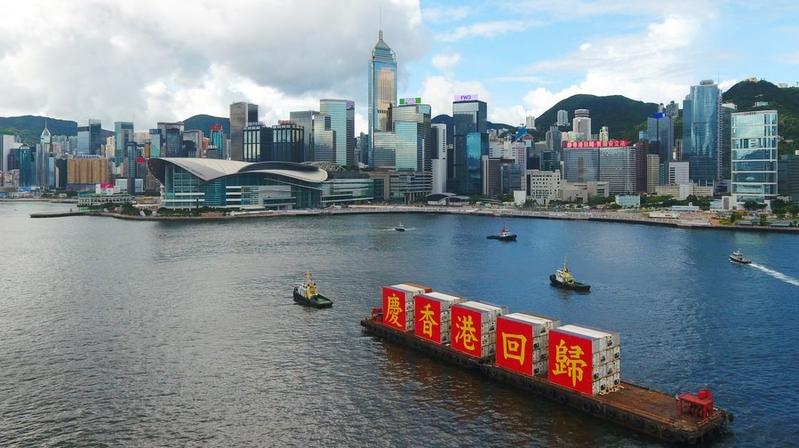 This undated photo shows people crossing a road in the Central district of Hong Kong. (PHOTO PROVIDED TO CHINA DAILY)
This undated photo shows people crossing a road in the Central district of Hong Kong. (PHOTO PROVIDED TO CHINA DAILY)
The much-awaited remedy to flaws in Hong Kong's electoral system will lift the city out of a bottomless political mire, enabling competent patriots to lead it into a more promising future, according to local political and legal experts.
They believe the legitimate and justified legislative proposal for the city, put forward by the nation's top legislature, serves Hong Kong's practical needs and will bring profound positive changes to its political and economic environment.
To plug loopholes that long existed in the electoral system of the Hong Kong Special Administrative Region, the National People's Congress submitted a draft decision on improving the system to the fourth session of the 13th NPC, which ends on Thursday.
The draft decision proposes establishing a new democratic system suited to Hong Kong's practical needs and characteristics by reforming the election for lawmakers and restructuring the committee that elects the city's chief executive.
To plug loopholes that long existed in the electoral system of the HKSAR, the National People's Congress submitted a draft decision on improving the system to the fourth session of the 13th NPC. The move would help bring more patriotic forces representing grassroots people's interests into Hong Kong's governance team
Once the NPC Standing Committee amends the Annex I and Annex II of the HKSAR Basic Law, the Hong Kong government will apply the amendment through local legislation, along with the improved system in upcoming elections.
ALSO READ: CE: HK legislation on electoral improvements in 12 months
The proposed amendment is in response to the protracted chaos witnessed in Hong Kong's Legislative Council and district councils.
In recent years, especially after social unrest in 2019, the two organs of Hong Kong's political system often descended into mayhem, with irresponsible lawmakers and district councilors continuously obstructing or even paralyzing the councils' operations, brazenly advocating violence and seeking foreign sanctions to pressure local authorities over political demands.
Leung Chun-ying, vice-chairman of the National Committee of the Chinese People's Political Consultative Conference, believes the improved electoral system will pave the way for the city to fully implement the principle of "patriots governing Hong Kong".
In an interview with Xinhua News Agency on Monday, Leung said that after the improvements are made, those who are unpatriotic to the country would be screened out of the governance structure-effectively enhancing administrative quality and safeguarding national interests.
He added that there would still be room for constructive suggestions and criticism, but never for radical attempts to topple the government.
Rita Fan Hsu Lai-tai, a former Hong Kong member of the NPC Standing Committee, believes its proposal will prevent Hong Kong from "falling into the abyss" again, as it did in 2019.
Fan, also the first president of the Hong Kong SAR Legislative Council, said in an interview with China Daily on Monday that after the city fully implements the "patriots governing Hong Kong" principle with the electoral improvements, Hong Kong will return to the path of democracy with its own characteristics.
She said the city would eventually have universal suffrage under the framework of "one country, two systems" in accordance with the Basic Law, but it would never achieve democracy if riots and separatism were left unchecked.
 This undated photo taken from Tsim Tsa Tsui, Kowloon, shows a view of the skyscrapers in the Central district of Hong Kong. (PHOTO PROVIDED TO CHINA DAILY)
This undated photo taken from Tsim Tsa Tsui, Kowloon, shows a view of the skyscrapers in the Central district of Hong Kong. (PHOTO PROVIDED TO CHINA DAILY)
Legitimate initiative
According to the draft decision, the improvements to Hong Kong's electoral system will be made via a two-step approach-the NPC will first make a decision, and then its Standing Committee will amend Annex I and Annex II of the HKSAR Basic Law to amend the relevant parts of the city's electoral system.
Fan stressed that it is the responsibility of the NPC, the top organ of State power, to ensure that Hong Kong's electoral system will work for the city's stability and prosperity, and that the Basic Law and "one country, two systems" are properly implemented in Hong Kong as originally intended.
She endorsed the NPC to take the initiative to help the city resolve longstanding flaws in its electoral system, adding that it was difficult for Hong Kong to handle this on its own.
Fan noted that "under the realities in Hong Kong", it was hard for an amendment to Annex I and Annex II of the Basic Law to be passed in the local legislature due to obstruction by opposition lawmakers, and that after their mass resignation, the proposal technically cannot win a two-thirds majority in the legislature.
It is the responsibility of the NPC, the top organ of State power, to ensure that Hong Kong's electoral system will work for the city's stability and prosperity, and that the Basic Law and "one country, two systems" are properly implemented in Hong Kong as originally intended, said Rita Fan Hsu Lai-tai, a former Hong Kong member of the NPC Standing Committee
She said it has been universal practice for countries and regions to adjust their electoral systems over time, according to their actual situations.
For example, in the United States, the House of Representatives passed a bill last week to introduce measures to reform the electoral system, including modernizing the country's voting systems.
READ MORE: Expats say governance by patriots is a universal practice
Hong Kong's electoral system has also been improved on several occasions to keep pace with the times. The committee electing the chief executive has been expanded twice since Hong Kong returned to the motherland in 1997, with the number of members being raised from the original 400 to 1,200.
Elsie Leung Oi-sie, Hong Kong's former secretary for justice and former deputy director of the Hong Kong Basic Law Committee of the NPC Standing Committee, said the proposal conforms with the HKSAR's Basic Law. This stipulates that the region's electoral system should be gradually improved in light of the actual situation.
She said that in view of the series of social disturbances and the increasingly complex international environment, Hong Kong faces a great risk of being exploited as a base for subversion to harm the nation's interests. The NPC took this into account.
She thinks the current peaceful situation in Hong Kong is only temporary. If deficiencies in the city's electoral system remain unchecked, the violence may return after the pandemic is controlled. Such a resurgence would be fatal for Hong Kong, she said.
Under such circumstances, it is natural and imperative to amend the electoral system to ensure Hong Kong's administrative power does not fall into the hands of mobsters, she added.
 This undated photo shows a boy playing on a slide at a playground while other family members watch, at a public housing estate in Tin Shui Wai, New Territories, Hong Kong. (PHOTO PROVIDED TO CHINA DAILY)
This undated photo shows a boy playing on a slide at a playground while other family members watch, at a public housing estate in Tin Shui Wai, New Territories, Hong Kong. (PHOTO PROVIDED TO CHINA DAILY)
New political landscape
The proposed improvements will mainly center on restructuring the SAR's Election Committee. In addition to changes to its size, composition and formation method, the committee will be entrusted with electing a relatively large proportion of Legislative Council members and with taking part directly in the nomination of all candidates for the legislature.
Fan said the arrangement for Election Committee members to choose some legislators is not new-it was adopted in the Hong Kong SAR's first-term legislature in 1998.
After Hong Kong is clear of political strife and can refocus on developing its economy and improving people's lives, its administrators must work hard to resolve deep-seated social and livelihood problems in order to fulfill their duties, Lau Siu-kai, vice-president of the Chinese Association of Hong Kong and Macao Studies said
Veteran political scholar Lau Siu-kai, vice-president of the Chinese Association of Hong Kong and Macao Studies, a national think tank, said the initiative would bring Hong Kong a brand new political environment, with a higher threshold for administration candidates and wider participation from various sectors.
Lau said the current formation of the SAR's election committee mainly favors the interests of business groups.
READ MORE: Electoral upgrade for HKSAR urgently needed, envoy says
The reshuffle, which aims to include a wider range of representatives on the committee, would help bring more patriotic forces representing grassroots people's interests into Hong Kong's governance team. This would enable the government to better overcome possible obstruction by vested interests and consortiums to future economic and livelihood reforms, he said.
Lau said he thought that after the administration led by patriots is formed, the pro-establishment camp would not go unchallenged and should still be held accountable for its work.
After Hong Kong is clear of political strife and can refocus on developing its economy and improving people's lives, its administrators must work hard to resolve deep-seated social and livelihood problems in order to fulfill their duties, he added.
 A vessel with a slogan celebrating the 23rd anniversary of Hong Kong's return to the motherland sails across the Victoria Harbour, Hong Kong, July 1, 2020. (PHOTO / XINHUA)
A vessel with a slogan celebrating the 23rd anniversary of Hong Kong's return to the motherland sails across the Victoria Harbour, Hong Kong, July 1, 2020. (PHOTO / XINHUA)
Promising outlook
Hong Kong NPC deputy Witman Hung Wai-man believes that the stable political environment resulting from the electoral improvements will enable the city to seek broader prospects in national development, especially under the 14th Five-Year Plan (2021-25), which will guide the nation's overall development during this period.
The draft outline of the plan, which was submitted to the NPC for deliberation on Friday, has a chapter devoted to the participation of the Hong Kong and Macao SARs. The draft pledges to offer firm support for Hong Kong to shore up its traditional economic edge and deepen cooperation with the Chinese mainland.
Hong Kong NPC deputy Witman Hung Wai-man believes that after more patriots enter the administration, Hong Kong can expect to see further initiatives to explore opportunities for cooperation with mainland cities
Hung is also the principal liaison officer for Hong Kong at the Shenzhen Qianhai Authority, which administers Qianhai, a pilot zone for collaboration between Hong Kong and Shenzhen, Guangdong province.
He believes that after more patriots enter the administration, Hong Kong can expect to see further initiatives to explore opportunities for cooperation with mainland cities.
READ MORE: HK legal sector: Basis of NPC electoral reform plan solid
Many cooperation projects between Hong Kong and the mainland were previously shelved or postponed, due to obstruction by those who are unpatriotic but have important statutory power on bodies such as the Legislative Council, Hung said.
For example, Hong Kong opposition lawmakers raised strong objections to the co-location arrangement for West Kowloon Station on the high-speed rail link between Hong Kong, Shenzhen and Guangzhou, Guangdong's provincial capital, before the rail began operation in 2018.
As the five-year plan provides an ideal platform for Hong Kong's deeper collaboration with the mainland, the city must strictly adhere to the "patriots administering Hong Kong" principle to accelerate the process for a quick economic revival, Hung said.
Contact the writers at bingcun@chinadaily.com.cn


